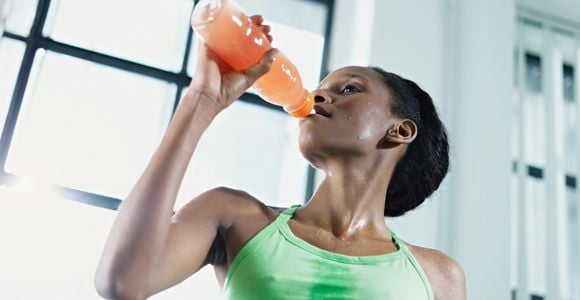Sports drinks have an image that may be confusing for many. In advertisements, these drinks are the beverages of extremely fit athletes, giving the impression that sports drinks promote and maintain health. While on the other hand, numerous organizations like the U.S. Department of Health and Human Services and the Centers for Disease Control and Prevention lump sports drinks in with other sugary beverages like soda, juice and energy drinks, and ask that you stop consuming them because they are harmful to your health. The truth is that these drinks can be beneficial in some situations, but are not appropriate for all. Below we'll help you decide when and if sports drinks are right for you.
Physically Demanding Careers
Athletes, soldiers and manual laborers tend to lead physically demanding lives. Staying adequately hydrated before, during and after activity is very important for these individuals' performance, health and well-being.
For many of these people the drive to consume fluids may be blunted due to distraction, inconvenience or unavailability of fluids. Additionally, according to the Academy of Nutrition and Dietetics, the body's thirst cues in these instances do not usually kick in until some dehydration has already occurred. Sports drinks may work well for those with physically demanding careers because they are easy to drink and conveniently provide the body with hydration and energy for muscles.
Extreme Weather
When people live and are physically active in extremely hot or cold environments, they typically do not get enough fluids to replenish the body. In extreme heat and high humidity, evaporation is slow and the body has to work harder to maintain a normal temperature. In cold weather, exposure to the elements can reduce the sensations for thirst.
Those who are most likely to suffer from dehydration in these climates are older adults, young children and individuals who are sick, overweight or who have overexerted themselves from activity. Sports drinks in small amounts may be necessary when the body is exposed to extreme temperatures.
Limited-Energy Intake
For competitors like wrestlers and boxers who have weight divisions or classes, they often must limit their caloric intake in order to make a weight category. When these individuals need to keep their weight in check but continue to perform heavy exercise, sports drinks may be used if a high quality meal is not eaten before a workout. The carbohydrate in the sports drink will help sustain physical activity.
Others
In general, sports drinks are not appropriate for individuals who do not fall into one of the categories or situations above. For those that perform exercise in moderate frequencies, intensities and climates, electrolytes and fluids can be adequately replenished by drinking water and consuming a balanced diet.
When consumed simply as a casual beverage, sports drinks can cause just as many health issues as drinking other sugary beverages. According to the Harvard School of Public Health, consumption of sugary drinks increases the risk of obesity, diabetes, heart disease and gout.
Mandy Seay is a bilingual registered and licensed dietitian who holds both a bachelor's degree in nutrition and in journalism. After gaining 30 pounds while living abroad, Mandy worked to lose the weight and regain her health. It was here that she discovered her passion for nutrition and went on to pursue a career as a dietitian. Mandy currently works as a nutrition consultant and freelance writer in Austin, Texas, where she specializes in diabetes, weight management and general and preventive nutrition. She recently published her first book, Your Best Health, a personalized program to losing weight and gaining a healthy lifestyle. Please visit Mandy's website at Nutritionistics.com.




